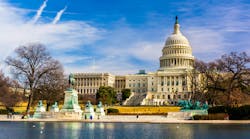Global climate change poses a serious threat to lakes, streams, rivers and wetlands throughout the United States, according to a new report from the Pew Center on Global Climate Change. The temperature increases and variations in weather patterns projected for the next 100 years will result in changes in the geographic distribution of freshwater fish, interfere with the reproduction of many aquatic species, reduce water quality and impose added stresses on wetlands and other sensitive aquatic ecosystems.
"The United States' freshwater and wetland ecosystems face multiple threats to their health and stability, including changes in land use, environmental pollution and the diversion of water for drinking, irrigation and other uses," said Eileen Claussen, President of the Pew Center on Global Climate Change. "To these threats we must now add the very real and very serious effects of global climate change and its potential to transform the essential character of our lakes, rivers, streams and wetlands."
The Pew Center report, Aquatic Ecosystems and Global Climate Change: Potential Impacts on Inland Freshwater and Coastal Wetland Ecosystems in the United States, draws on a variety of sources to summarize researchers? current understanding of the potential impacts of climate change on U.S. aquatic ecosystems. The report's key conclusions include the following.
* Increases in water temperatures as a result of climate change will alter the geographic distribution of aquatic plant and animal species. The severity of these impacts may be limited if species can migrate to new areas as climate changes. However, the ability of species to migrate may be compromised by human activities that block migration corridors, potentially causing reductions in biodiversity.
* Changes in precipitation will alter river and streamflows affecting ecosystem productivity and reducing water quality. Populations of aquatic organisms are sensitive to the effects of floods, droughts and other extreme weather events, which are likely to increase as a result of climate change.
* Climate change is likely to further stress sensitive freshwater and coastal wetlands. Wetlands throughout the United States already are adversely affected by a variety of human impacts. Climate change will add to the existing stresses on these fragile ecosystems in a variety of ways--most notably by causing global sea levels to rise and inundate coastal wetlands. Rising global temperatures also will cause the wetland areas of Alaska and Canada to release additional carbon dioxide and other greenhouse gases into the atmosphere.
* Aquatic ecosystems have a limited ability to adapt to climate change. Governments, communities, businesses and individual citizens can take a number of steps to reduce the likelihood of significant impacts to these systems while improving their ability to adapt to climate change. These include maintaining riparian forests, reducing pollution from a variety of sources, restoring damaged ecosystems, minimizing groundwater withdrawal and strategically placing new reservoirs to minimize their ecological impacts.
"Our rivers, lakes, streams and wetlands support economically important fisheries and provide Americans with clean drinking water, water for irrigation, recreational opportunities, and more," Claussen said. "This report shows that climate change puts all of these services at risk, but it also shows there are things we can do to reduce that risk."
Source: Pew Center on Global Climate Change

